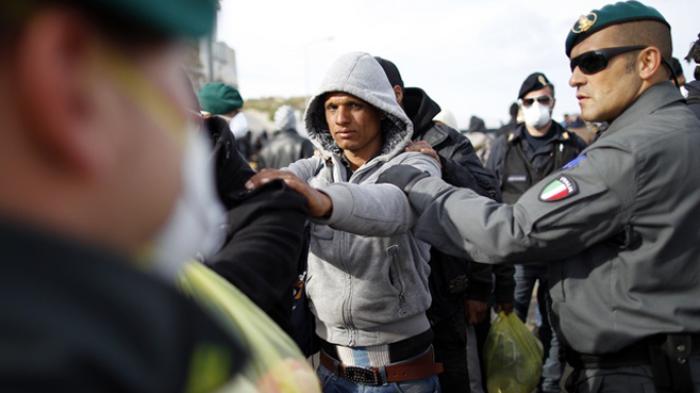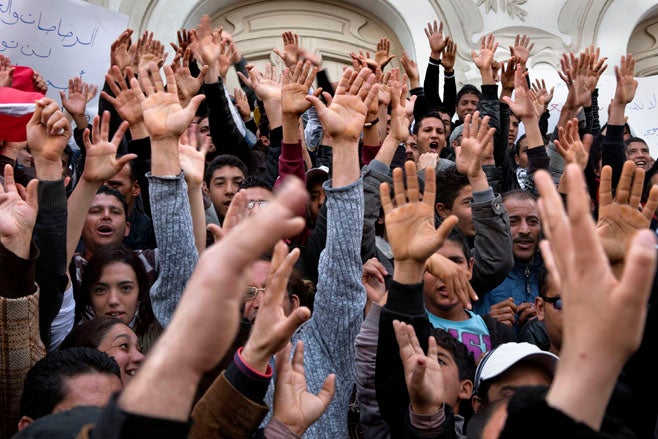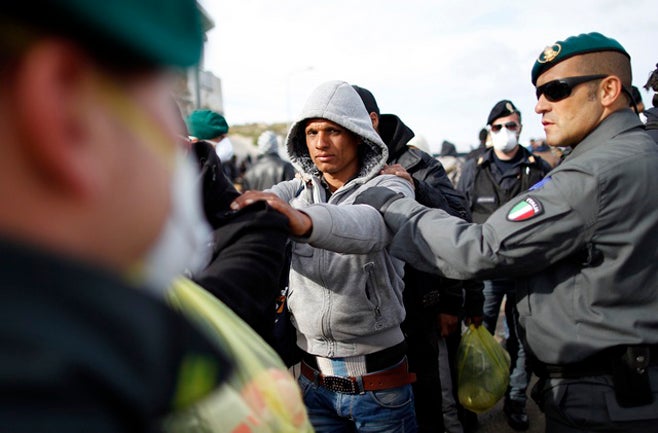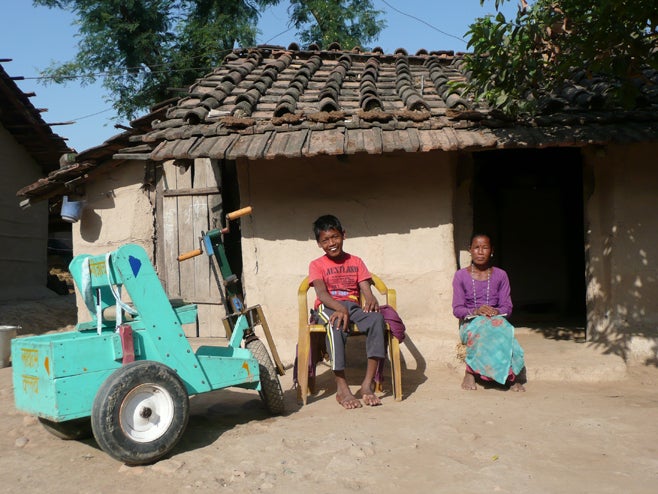To many friends of human rights in Europe, the Arab Spring has been the most thrilling period since the fall of the Berlin Wall. Judging from their soaring rhetoric about yearning for freedom among Arab peoples, European Union leaders share that enthusiasm. Today there is an opportunity, the optimists proclaim, to have an arc of human rights-respecting countries around much of the Mediterranean rim.
The reality of human rights policy in Europe itself and toward its Mediterranean perimeter has been far less edifying. Documents discovered in Libya by Human Rights Watch in September 2011 evidenced British complicity in rendition to Libya under Muammar Gaddafi. Italy, which was willing to send African migrants and asylum seekers back to Libya during the Gaddafi era to face abuse and worse, moved quickly to sign a migration cooperation agreement with the transitional authorities there (although at this writing it has yet to resume forced returns). EU governments have proved reluctant to help migrants and others fleeing war-torn Libya. The arrival of thousands of Tunisian migrants in Italy beginning in January led leading EU governments to question free movement inside the EU, one of its fundamental pillars.
Move beyond the fine words and human rights in Europe are in trouble. A new (or rather a resurgent old) idea is on the march: that the rights of “problematic” minorities must be set aside for the greater good, and elected politicians who pursue such policies are acting with democratic legitimacy.
At first glance, the idea of a human rights crisis in Europe might seem far-fetched. But scratch beneath the surface and the trends are truly worrying. Four developments stand out: the rollback of civil liberties in state responses to terrorist attacks; the debate around the place of minorities and migrants in Europe, a debate too often laced with xenophobia; the rise of populist extremist parties and their baleful influence on public policy; and the diminishing effectiveness of traditional human rights institutions and tools. Unless governments wake up to the scale of the threat, the next generation of Europeans may see human rights as an optional extra instead of a core value.
Counterterrorism and the Attack on Rights
Terrorist violence in Europe is nothing new. Nor is human rights abuse as part of the effort to counter it. But the 9/11 attacks, and the subsequent attacks in Madrid and London, triggered policy responses in Europe that caused lasting damage to the human rights cause.
In the past decade, European governments too often have shown a willingness to chip away at the absolute global prohibition of torture, exposing terrorism suspects to violent abuse and illegal detention overseas, using the fruits of that torture at home, and denying terrorism suspects the rights accorded to others accused of crimes. Even now, we do not know the full extent of European complicity in US abuses (rendition, “black sites,” and torture) under the Bush administration. (Some governments, like Norway, have resisted the temptation, responding to terrorist violence using the rule of law).
While many of these laws and policies were deeply problematic, and in some cases remain unchanged today (especially where courts or national parliaments were unable or unwilling to curb them), the rhetoric around them arguably represents an even worse legacy.
Many EU governments sought to construct a new paradigm in which human rights had to take second place to security or be set aside entirely. As then-British Prime Minister Tony Blair claimed after the July 2005 suicide attacks in London, “the rules of the game are changing.” While public concern about terrorism has been largely supplanted by worries about jobs and social services (even though the threat remains), these poisonous ideas have taken root.
European politicians mounted a three-pronged attack on universal human rights in the context of combating terrorism. The first was that terrorism suspects deserve fewer rights than others. The second was that Europe could have security or human rights, but not both. The third was that human rights are a zero sum game, so that rights for the majority can only be secured by sacrificing the rights of the minority suspected of terrorism.
Driven by fear, many in Europe accepted these arguments. Offered a chance to trade away those rights to assuage their fear, people willingly did so, especially when the rights at risk were not, or did not seem to be, theirs.
The Place of Migrants and Minorities
Intolerance towards migrants and minorities in Europe is widespread. Polling data from 2010 shows that a majority in eight EU states shared the view that there are too many immigrants, with as many as half concluding the same of Muslims.
Fears about loss of culture, terrorism, crime, and competition for economic resources all help explain rising intolerance in Europe. Europe’s current economic and financial crisis and resulting austerity is likely to exacerbate the intolerance.
Europe’s Muslims and Roma experience persistent hostility and discrimination across the region, as an EU Fundamental Rights Agency survey from 2009 showed. Undocumented African migrants face significant problems, including discrimination and violence. While individual attacks are common in the region, in some cases this has spilled over into mob violence, including in Italy (against African migrants and Roma), in Greece (against migrants), and in Eastern Europe (against Roma).
European governments have responded in ways that are deeply corrosive of respect for universal rights. Rather than emphasizing that Europe’s history has been shaped by migration, pointing to the many contributions made by minorities and migrants and forcefully condemning racism and intolerance, they have played on these fears.
Cultural and religious practices can of course violate human rights, and those who engage in discriminatory or abusive conduct must be held to account. But what is happening in Europe goes far beyond concern with the conduct of specific individuals.
The response has included blaming marginalized communities for the conduct of a handful of people (as with Roma in Italy); seeking to close Europe’s borders at the EU and national levels; restrictive and abusive asylum procedures and abusive migrant detention conditions (notably in Greece), with unaccompanied migrant children at particular risk; and in the name of integration, telling migrants (even second or third generation) that they must embrace majority culture, and if they do not, face sanction, or leave (in Germany, the Netherlands, Denmark and elsewhere).
Muslims in Europe have borne the brunt. Fears of so-called home-grown terrorism after the Madrid and London bombings, a string of alleged terrorism plots, and concerns over loss of culture prompted by the more visible presence of observant Muslims have put the continent’s diverse Muslim communities under scrutiny, their loyalty implicitly challenged.
Fear of Muslims has impacted wider policy debates about “integration,” a byword for a whole basket of anxieties and concerns about the place in society of migrants, especially Muslim migrants, and has led to calls for action.
At heart the anxiety about the place of Muslim migrants in Europe, as a recent report by the think tank Chatham House pointed out, is cultural. The headscarf and face-covering niqab, and to some degree minarets and mosques, have played such an important role in these debates because they are visual reminders that Muslims live in Europe and are here to stay.
Fear of the place of Muslims in Europe did not begin with al Qaeda’s attacks on September 11, 2001. What changed that day was the characterization of Bangladeshi, Pakistani, Moroccan, and Turkish migrants in Europe. While many European officials sought to draw a clear distinction between the acts of a small group and Muslim communities as a whole, policy responses and debates about how to counter the home-grown threat frequently created the impression that Muslim communities were suspect.
The impact on human rights in Europe is real. On a practical level, forced integration and a concept of integration that requires no accommodation by the wider society is doomed to fail. When policymakers play into public fears about loss of culture and pursue policies that increase rather than lessen xenophobia, they put the rights of European minority communities at risk. Perhaps worse, they reinforce the dangerous zero-sum conception of rights—minorities must be forced to accept majority culture (or “Christian values” as the German chancellor suggested in 2010) and if they refuse to do so their rights must be set aside for the greater good.
Among Roma, Europe’s largest minority, the picture on human rights is bleak. At the EU level there is recognition that the persistent discrimination and marginalization experienced by Roma requires positive intervention and support, and officials have devised a strategy to that end. But Roma continue to be stigmatized at national levels across the EU. And like migrant communities, Roma are likely to be disproportionately affected by austerity measures.
The experience of Roma migrants from Eastern to Western Europe and the problematic policy responses to them have some parallels with those faced by Muslims, but with fears of a purported epidemic of crime taking the place of fears of terrorism, and with economic rather than cultural concerns predominating. Forced evictions and expulsions of Eastern European Roma, who are EU citizens, by France and Italy exemplify the impact of these fears. Forced evictions remain a common feature of Roma policy across the EU.
Further east, in Hungary, Romania, Bulgaria, the Czech Republic, and Slovakia, the situation is even more alarming, with violent attacks and anti-Roma rhetoric and little progress towards ending housing and school segregation despite hundreds of millions of euros of EU funding and rulings of the European Court of Human Rights (ECtHR, a Council of Europe court that binds EU states).
This is bad news for Roma. But it is also bad news for human rights in general. Once again, policymakers in Europe prefer to yield to, and in some cases exacerbate, public concerns at the expense of an unpopular minority rather than saying loud and clear that Europe’s values demand rights for all.
Populist Extremism
The failure of leadership and negative rhetoric by European governments is connected to a third worrying trend: the rise of populist extremist parties.
The terrorist act in July 2011 by Anders Breivik that left 77 Norwegians dead was a stark reminder that extremism and political violence are not confined to those acting in the name of Islam. Breivik’s twisted manifesto cited with approval populist extremist parties across Europe, though the decision to engage in terrorism was his alone.
The growing success of these parties at ballot boxes across the continent is having a profound impact on mainstream politics. Where populist extremist parties form part of ruling coalitions (as in Italy and Switzerland), or formally support minority governments (as in the Netherlands), the impact on mainstream politics is immediately evident. More generally, mainstream parties have responded to the growing electoral share of populist extremist parties in ways that move away from human rights-respecting policies.
In Western Europe, extremist parties have put the place of Muslims and their alleged threat to European culture at the forefront. Some, like Italy’s Northern League, also focus on migrant communities more generally.
The focus on Muslims and fears of terrorist attacks allows these parties to more easily resist accusations of racism and xenophobia (some even distinguishing “good” minority communities from Muslim minority communities) and to present the views held by conservative Muslims on women’s rights and homosexuality as illustrative of the threat even though conservative Christians with similar views have not faced the same vilification.
Populist extremist parties in the eastern part of the EU are more focused on Roma than Muslims. Examples include Jobbik, the third largest party in Hungary’s parliament, which has links to aparamilitary group implicated in attacks on Roma, and the Slovak National Party, part of the ruling coalition, whose leader recently called for the creation of a separate Roma state.
At a time of growing voter anger over austerity measures and mass unemployment, these messages risk attracting greater support.
Many in Europe continue to defend the rights of migrants and minorities and the importance of universality. But rather than standing up against populist extremism, mainstream parties have responded with co-option through coalition politics, adopting watered-down versions of the same policies or rhetoric, or in the case of some centre-left parties, with paralysis and silence.
In some cases, it is argued that the electoral success of the parties mean that it would be undemocratic for mainstream parties not to take account of their views.
Far from neutralizing the political challenge posed by populist extremist parties, these strategies have served instead to legitimize them and make them respectable, sending a message to voters that xenophobic, anti-Muslim, or anti-Roma sentiment is acceptable rather than a cause for shame.
The growth of populist extremist parties poses a real challenge for human rights in Europe. It engenders divisive politics. It reinforces the idea that the rights of the majority can only be upheld and respected if those of the minority are set aside, moving us further away from universality. And it legitimizes abusive policies on democratic grounds.
Declining Leverage
There is always a risk in a democracy that without responsible leadership the majority will support measures that harm the interests of the minority. This dilemma helps explain why human rights protections, which are designed in part to protect against “tyranny of the majority,” are more essential than ever. It is particularly alarming then that Europe’s human rights tools and institutions are proving ineffective in tackling these negative trends.
One often valuable tool—naming and shaming—only works when the government being identified is embarrassed by the disclosure that it is not playing by the rules. But the state of politics in many EU states today means governments are no longer embarrassed to pursue abusive policies, arguing that doing otherwise would risk losing ground to populist extremist parties.
Criticisms of abusive policies and rhetoric from human rights NGOs, from the Council of Europe, from the United Nations, from religious leaders, and even in some cases from EU institutions, are brushed aside. Examples include France’s forced evictions and expulsions of Roma, Spain’s incommunicado detention of terrorism suspects, Italy’s interdiction and pushbacks of migrants to Libya under Gaddafi, and Greece’s abusive detention of migrants. The perceived domestic political benefits of engaging in these kinds of policies frequently outweigh the inconvenience caused by international or regional condemnation.
Two institutions remain hard to ignore: the ECtHR and the EU’s European Commission.
The ECtHR still has real clout, although EU governments (notably Italy on terrorism expulsions) have begun to ignore some of its interim rulings and the court faces more general political attacks (particularly in the UK) for “straying” into domestic issues.
The European Commission has long had the power to hold EU states to account for breaking EU law. And after the Lisbon treaty, that includes human rights, with a dedicated fundamental rights commissioner.
France’s expulsion of Roma in the summer of 2010 showed the commission’s potential. Having ignored UN, Council of Europe, and European Parliament criticism of its policy, Paris reacted with fury when the commission took it to task.
Sadly, the commission eventually backed down, accepting in August 2011 legislative changes that did not address the fundamental discrimination motivating the expulsions. Its approach to Hungary’s media law and to Greece’s broken asylum system demonstrated a similar half-heartedness. In both cases, commission enforcement action was initiated but later discontinued or put on hold without adequately addressing the triggering problems.
Human rights are supposed to be integral to the European project. If the commission does not find more courage to hold member states to account when they break the rules, Europe’s downward slide on rights looks set to continue.
Conclusion
Europe’s declining respect for human rights has not gone unnoticed. Governments around the world have seized on abusive counterterrorism measures, attacks on migrants, Roma, and other minorities, and hostility towards Muslims both as justification for their own abusive policies and to undercut criticism by the EU. The European Parliament noted in 2009 the damage to the credibility of EU external human rights policy as a result.
Above all, Europe’s human rights crisis matters for its own sake. If these dangerous ideas—that some deserve fewer rights than others, and that the democratic will of the majority can choose to set aside rights for minorities—are left unchecked, the ideals of those who tore down the Berlin Wall will be betrayed, and the loss incalculable.







